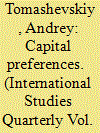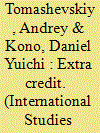| Srl | Item |
| 1 |
ID:
146159


|
|
|
|
|
| Summary/Abstract |
Many argue that government partisanship influences the size of investment flows into stocks and bonds. But existing literature tells us little about how international capital flows influence election outcomes. I argue that passive investment into stocks, bonds, and other debt instruments—in other words, portfolio investments—increases political contributions to right-wing parties. This investment generates resources for domestic capitalists. These owners of capital then channel these resources into political contributions to right-wing parties and enhance those parties' electoral position. Thus, passive investment bolsters the electoral chances of right-wing governments. I illustrate this process with a formal model of special interest politics in which lobbies operate under budget constraint. Using a new data set on political contributions and statistical analyses for a sample of states from 1980–2009, I find support for my general argument.
|
|
|
|
|
|
|
|
|
|
|
|
|
|
|
|
| 2 |
ID:
139530


|
|
|
|
|
| Summary/Abstract |
Credit rating agencies such as Moody's and Standard & Poor's have considerable influence in the global economy. Nonetheless, we know little about the factors that affect these ratings, particularly factors under government control. We argue that participation in preferential trade arrangements (PTAs) can significantly improve national credit ratings by “locking in” liberal trade policies at home and abroad. This both ensures a stable stream of export revenues and represents a commitment to market-friendly policies of which the rating agencies approve. We test and find support for this hypothesis with an analysis of intra-PTA trade and credit ratings in 100 countries from 1971 to 2008. As expected, intra-PTA trade consistently improves national credit ratings. However, this effect is only partially mediated by trade volatility and other economic variables, suggesting that the rating agencies' support for PTAs is partly ideological in nature. Interestingly, overall trade openness does not affect credit ratings once we control for participation in PTAs. It is thus the formal commitment to open trade, rather than the volume of trade per se, that improves credit ratings. Our results point to the growing importance of private actors in international governance, as well as to the interrelated nature of trade and financial regimes.
|
|
|
|
|
|
|
|
|
|
|
|
|
|
|
|